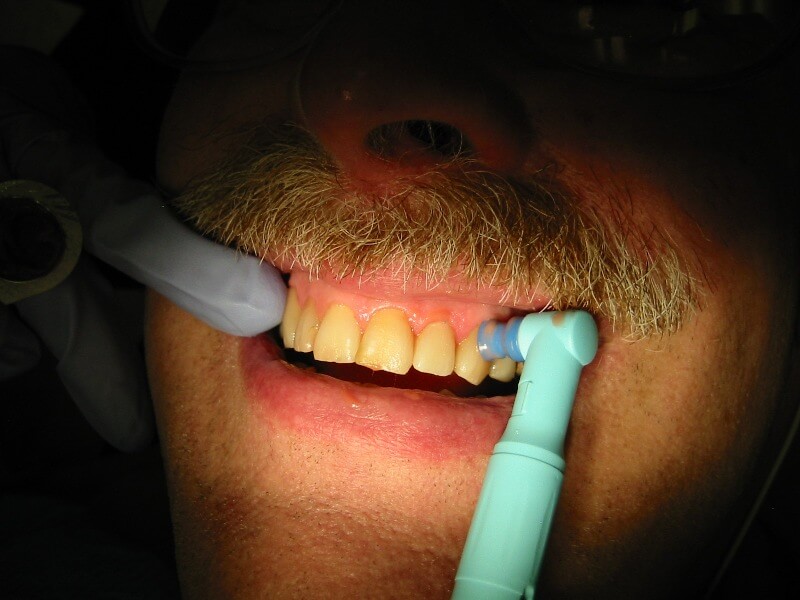Scaling & Polishing
What is dental cleaning or scaling and polishing of teeth ?
Dental cleaning is a procedure done by dentist and involves removal of plaque and tartar (calculus) deposits that have built up on the teeth over time.

What is the purpose of dental cleaning?
Our teeth are continually bathed in saliva which contains calcium and other substances which help strengthen and protect the teeth.
While this is a good thing, it also means that we tend to get a build-up of chalky substance like calcium deposits on the teeth.
Usually it is tooth coloured and can easily be mistaken as part of the teeth, but it also can vary from brown to black in colour.
If the scale, or calculus (tartar, as dentists like to call it) is allowed to accumulate on the teeth it will unfortunately provide the right conditions for bacteria to thrive next to the gums.
The purpose of the scaling and polishing is basically to leave the surfaces of the teeth clean and smooth so that bacteria are unable to stick to them.
How are the teeth cleaned?
Dentists use specialized instruments to gently remove tartar deposits without harming the teeth.
The processes involved in dental cleaning are described below.
- Ultrasonic instrument – Ultrasonic instrument uses tickling vibrations to knock pieces of tartar loose. It also sprays a cooling mist of water while it works to wash away debris and keep the area at a proper temperature.
- Fine hand tools – Dentists use finer hand tools (called scalers and curettes) to remove deposits and smoothen the tooth surfaces.
These tools are curved and shaped to match the curves of the teeth. They allow smaller tartar deposits to be removed by carefully scraping them off with a gentle to moderate amount of pressure. - Polishing – Once all the surfaces are smooth, the dentist will polish the teeth. Polishing is done using a slow speed handpiece with a soft rubber cup that spins on the end. A special gritty toothpaste-like material is scooped up like ice cream into the cup and spun around on the teeth to make them shiny smooth.
Does it hurt to have the teeth cleaned?
Most people find dental cleaning procedure as painless. The sensations of tickling vibrations, the cooling mist of water, and the feeling of pressure during scraping do not usually cause discomfort.
A lot of people even enjoy the lovely smooth feel of their teeth after the cleaning procedure.
Sometimes there may be painful experiences. These are due to a number of things like
- A rough dentist – Switching to a gentle dentist might help.
- Exposed dentine – Can make dental cleanings an unpleasant experience.
- Sore gum tissues – Topical numbing sprays or gels might help.
A patient can also choose to be numbed. For cleaning under local anaesthetic, dentists usually like to carry out the treatment in 2 visits. If both sides of the mouth are numbed at the same time, people may accidentally bite their tongue before the numbness has worn off.
What do we mean by GUM disease?
Gum disease is an inflammation of the gum line that can progress to affect the bone that surrounds and supports your teeth. The three stages of gum disease — from least to most severe — are gingivitis, periodontitis and advanced periodontitis.
What are the symptoms and signs of gum disease?
Gum disease can be painless with a patient observing any of the following signs and symptoms:
- Swollen, red, tender or bleeding gums.
- Gums that recede or move away from the tooth.
- Persistent bad breath or bad taste in mouth.
- Loose teeth.
- Visible pus surrounding the teeth and gums.
How to treat gum disease?
Root Planing and Scaling is one of the most effective ways to treat gum disease before it becomes severe. It involves cleaning between the gums and the teeth down to the roots. It is done when gums have either started to pull away from the teeth or the roots of the teeth have hard mineral deposits (tartar) on them.
The process is similar to scaling and polishing of teeth as described above.
How effective is the treatment of gum disease?
Root planing and scaling is a simple procedure that can work very well to stop gum disease.
If we maintain good dental care after the procedure, the progression of gum disease should stop and the gums will heal and become firm and pink again.
Good dental care involves brushing and flossing teeth regularly afterward. Without proper dental care, the gum disease may progress.
To promote healing, it is advisable to stop use of tobacco in all forms. Smoking or using spit tobacco reduces your ability to fight infection of gums and delays healing.
FAQs on scaling and polishing
You need to consult a dentist for your teeth cleaning in Siliguri.
The cost of teeth cleaning in Siliguri varies depending on the extent and severity of deposits. It may cost around Rs 1000 or above.
Dr Shikha Agarwal, among the top dentist in Siliguri, will do your scaling and polishing.
Timings of Dr Shikha Agarwal is as below:
Morning: 10:00 am to 1:00 pm ( Monday to Saturday)
Evening: 5:00 pm to 8:00 pm ( Monday to Saturday)
Yes, it is recommended that you book an appointment before you consult Dr Shikha Agarwal.
To book an appointment with Dr Shikha Agarwal please call the reception desk at 9832229559 or 9547612556. For more details visit this link – book an appointment with Dr Shikha Agarwal



